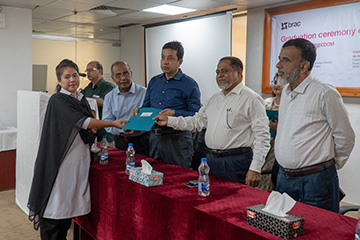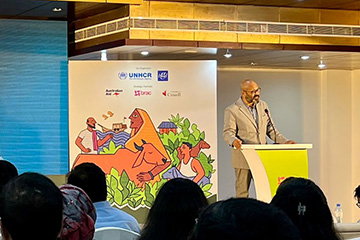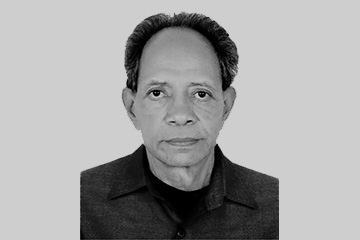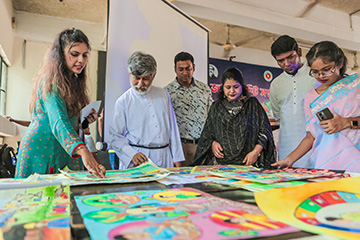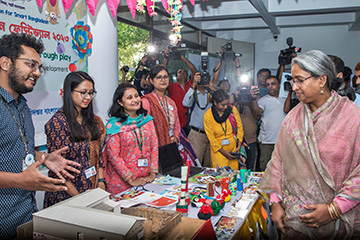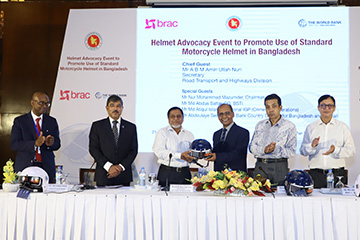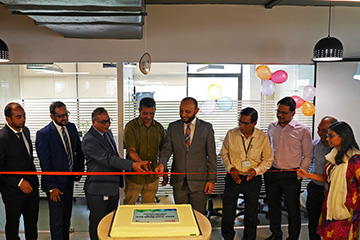
English (959)
Children categories
Women trained at BRAC Driving School receive professional driver’s certificate
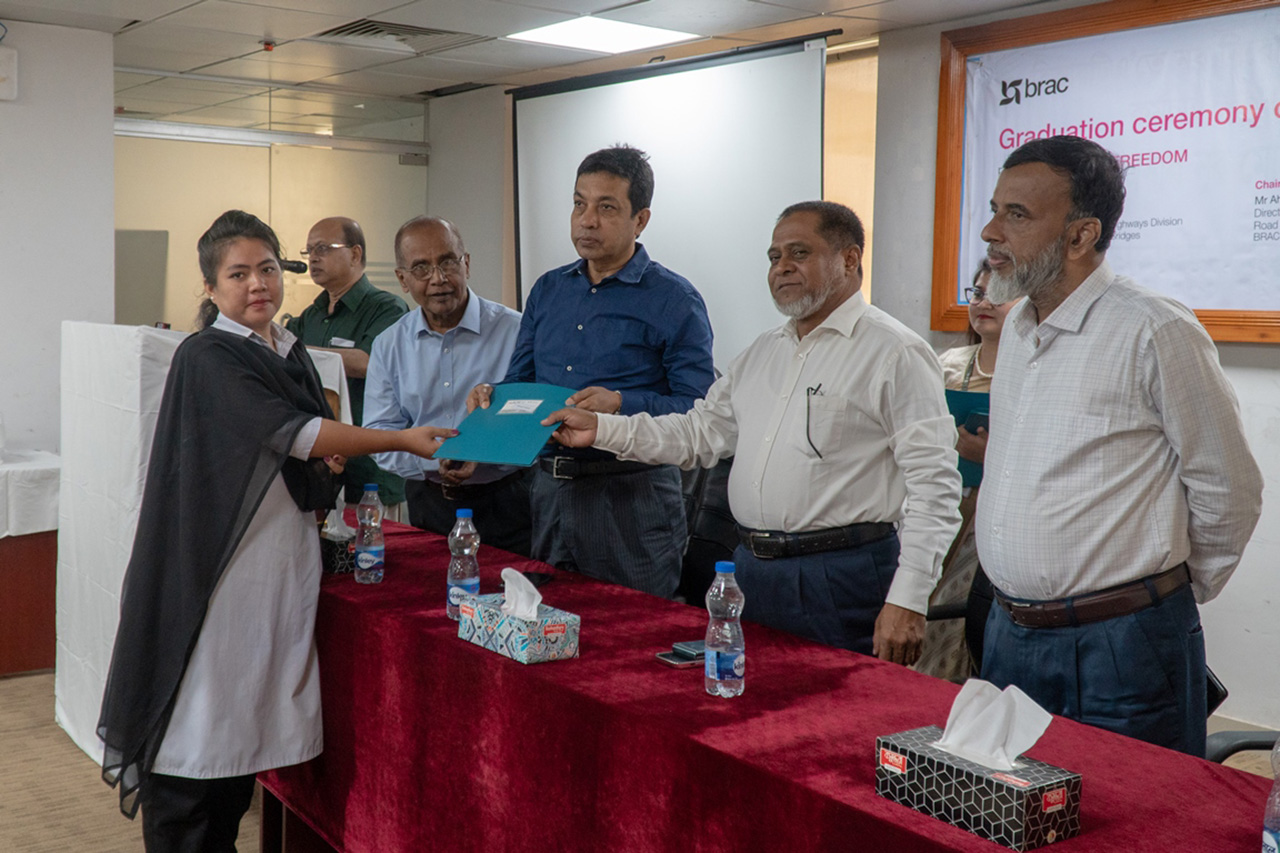
Eleven women have been awarded the certificates as professional drivers after successfully completing their training at the BRAC Driving School. These women are now confident in their hard-earned skills. They said this achievement has come through their indomitable spirit and the high-quality driving training programme run by BRAC, one of the largest development organisations in the world.
To award the certificates, an event was organised today (Wednesday, 26 July 2023), at BRTA Bhaban, the head office of Bangladesh Road Transport Authority (BRTA). The event was attended by A B M Amin Ullah Nuri, secretary of Road Transport and Highways Division, BRTA, as the chief guest. Ahmed Najmul Hussain, director of BRAC Road Safety Programme, chaired the event, with Nur Mohammad Mazumder, chairman of BRTA, and Md. Tazul Islam (additional secretary), chairman of Bangladesh Road Transport Corporation (BRTC), attending as special guests. Mainul Hossain, manager of BRAC Road Safety Programme, gave an overview of BRAC’s programmes and activities on road safety.
The organisers stated that the 11 trainees attended a 3-month-long residential, extensive training programme conducted by BRAC Driving School in the capital. The school, equipped with the state-of-the-art driving training facilities, provided them with both theoretical and practical lessons. Additionally, they received basic communications skills training in English, as well as gender sensitisation and safeguarding training. After successfully completing the training, they participated in the licencing tests conducted by BRTA and successfully obtained their professional driver’s licences. Subsequently, they were assigned to BRAC’s transport division as apprentice drivers, where they will undergo further training for three months under the guidance of senior drivers.
A B M Amin Ullah Nuri, secretary of Road Transport and Highways Division, mentioned in his chief guest’s speech that although driving is a respectable profession, there is a prevailing culture of looking down upon it as a job. Consequently, driving does not attract many to take it up as their profession.
Regarding the employment of woman drivers, he informed the government reserves 10 per cent of its total driver positions for women. He also pointed out that there are buses for women commuters, but no women drivers or ‘helpers’. BRTC hires part-time drivers for its vehicles at the district level where the trained women drivers can join to gather experience.
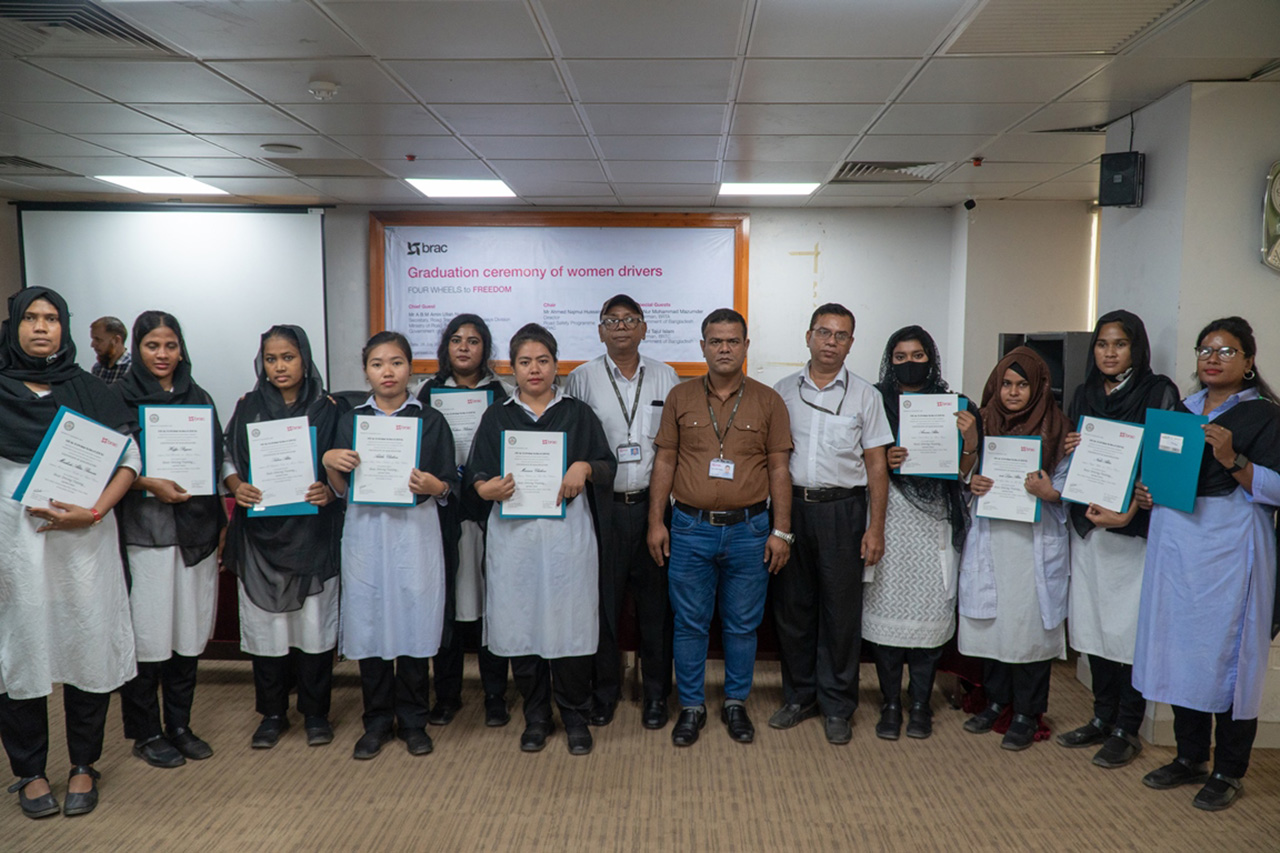 Nur Mohammad Mazumder, chairman of BRTA, stated, "This is an important profession, but unfortunately, we have not been able to train enough drivers. We haven’t been able to make the driver’s job a respectable one. Moreover, many people are not even aware of BRAC’s initiative for driver’s training. If they knew, many employers might come forward with job offers for the graduates coming out of this school.
Nur Mohammad Mazumder, chairman of BRTA, stated, "This is an important profession, but unfortunately, we have not been able to train enough drivers. We haven’t been able to make the driver’s job a respectable one. Moreover, many people are not even aware of BRAC’s initiative for driver’s training. If they knew, many employers might come forward with job offers for the graduates coming out of this school.
Tazul Islam (additional secretary), chairman of BRTC observed that there are family and societal barriers for women to become professional drivers. Often, families and society discourage women from joining professional driving. Last year, when BRTC advertised for 100 drivers, they could recruit at least 15 women, but only 1 female candidate applied. She got the job. This year as they are in the process of hiring 27 technicians, three female candidates have applied. As more women begin to join this profession, society's acceptance of female drivers will increase.
Ahmed Najmul Hussain, director, BRAC Road Safety Programme, stated in his chair’s remarks that as a standard, a person can qualify to become a driver with practical driving experience of 12 hours. However, our female drivers received about 100 hours of training and drove over 1,200 kilometres on the roads. All of them successfully passed the BRTA licence test on their first attempt and obtained their licences three months ago.
This training also included English language training and gender awareness lessons. These women are highly skilled drivers and should not be compared to other drivers, he further said.
Mousumi Khatun, one of the trained female drivers said, apart from driving skills, we have learned manners and etiquette and so many things, making us fully prepared for the job. Now, we are eager to find suitable employment opportunities.
BRAC Road Safety Programme has been operational since 2001 with the aim of increasing the safety of all road users. An important component of its activities is awareness-raising and training on safe road use. To date, BRAC has provided safe road users’ training to 1.2 million general road users, 561 thousand students, and 5,400 teachers across the country.
BRAC Driving School was established to produce skilled drivers with a focus on safe driving practices. So far, it has trained 11,535 people as commercial drivers, provided basic driving training to 8,147 individuals, and produced 2,698 trained women drivers. Additionally, It has trained 2,013 individuals in motorcycle driving and produced 384 driving trainers.
BRAC's graduation model assists local ultra-poor living in the host community in Cox’s Bazar to overcome poverty
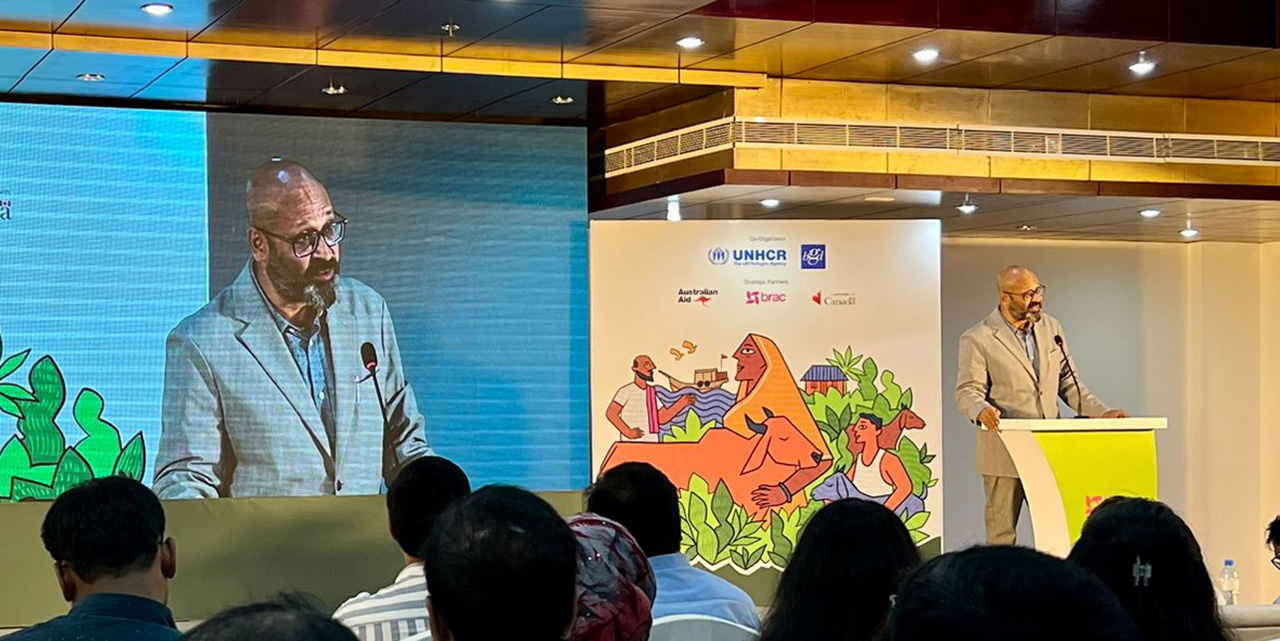
Over 900 thousand Myanmar nationals from the Rohingya community crossed over to Ukhya and Teknaf in Cox's Bazar in 2017, facing persecution and decimation. The situation exacerbated the life and livelihood crisis of the local ultra-poor host community in Cox’s Bazar, a district already burdened with high incidence of poverty.
In this context, the BRAC Ultra-Poor Graduation Programme (UPG) has been assisting ultra-poor women and their families in overcoming poverty. The program employs an approach that deeply and comprehensively understands their vulnerabilities, risks, and needs. As part of this initiative, BRAC recently implemented a pilot project with the objective of establishing stronger linkages between the ultra-poor and the local market, enabling them to sell their products effectively.
An event was arranged in Cox's Bazar to share the learnings of this pilot initiative implemented by the UPG programme. BRAC, BRAC Institute of Governance and Development (BIGD), and the United Nations High Commissioner for Refugees (UNHCR) organised the event on Tuesday (20 June) at a local hotel.
Dr. Narayan C. Das, associate professor and senior research fellow at the BRAC Institute of Governance and Development (BIGD), BRAC University, presented the findings of research on a programme run by UPG in Cox's Bazar since 2018. According to the findings, the participating families continue to achieve socio-economic progress at a rate of 96 per cent. During this time period, they have made significant growth in earnings, savings, wealth, and food security.
Dr. Imran Matin, executive director of the BRAC Institute of Governance and Development (BIGD), BRAC University, observed that there is a lack of solid data and evidence-based work in humanitarian contexts worldwide. BRAC's research sets a significant example in this regard.
Palash K Das, director of the UPG programme at BRAC, stated that the one-year market linkage pilot was implemented jointly by BRAC and UNHCR. The project had a two-fold objective: to increase the bargaining opportunities for the ultra-poor with market actors and to widen the scope for marketing the commodities they have produced. A total of 2,000 members from ultra-poor families participated in this pilot initiative.
Palash K Das further observed that the ultra-poor families living in the humanitarian context after the Rohingya influx gained economic growth through multifaceted support from the UPG programme. However, women from these families have limited access to the market as it is not stable. The main objective of the pilot initiative is to assist the women producers of ultra-poor families in achieving sustainable livelihoods and social integration by linking them with the mainstream economy.
The UPG director also mentioned that since the participants of the pilot project had very limited assets, they could not benefit much by operating individually in the market. Instead, they benefited more by moving into the market as a group, both for purchasing raw materials and selling their products. The project, in addition to organising various training programmes to improve market management capacity, also linked the participants with raw material sellers and product buyers. The project also helped improve their access to different services provided by the government and non-governmental organisations.
Md. Nasim Ahmed, additional deputy commissioner of Cox's Bazar, stated that the government has undertaken a number of poverty eradication and social protection programmes for people living in poverty across the country. However, Cox's Bazar, with a higher poverty rate and multidimensional complexities, requires collaboration from the government, non-governmental organisations, and private sectors to address its issues.
Subrata Kumar Chakrabarty, livelihood and economic inclusion officer at UNHCR, mentioned that the pilot project has provided important learnings for both BRAC and UNHCR. He recommended that future poverty eradication programmes should include market linkage aspects in their activities.
Farzana Zahid, senior development advisor (Rohingya response) at the High Commission of Canada, shared that she had conversations with members of the UPG programme who told her that earlier, people and neighbours did not invite them to attend social gatherings or events. But now, after their economic conditions have improved, they receive invitations.
Robert Stoelman, interim head of the Sub Office at UNDP, observed that the UPG programme has helped improve the lives and livelihoods of ultra-poor families, which in turn improves their social status.
Rozina Haque, associate director of the Ultra-Poor Graduation programme, delivered the closing remarks, stating that BRAC will incorporate the observations and recommendations brought up during today's event into its future initiatives.
Sheuly Sharma, executive director of a Cox's Bazar-based NGO, Jago Nari Unnayan Sangstha, also spoke at the event.
For over 20 years, the BRAC UPG programme has been working to enable the extreme poor in the country to lift themselves sustainably out of the state of destitution associated with ultra-poverty. According to the World Bank's definition, the extreme poor live on less than USD 2.15 per person per day. These individuals often lack access to food, education, basic services, and the skills needed to develop a sustainable livelihood. Since 2002, the UPG programme, a flagship of BRAC, has continuously adapted the graduation approach to meet the changing needs of people living in ultra-poverty and destitution. Inspired by the concept of "Leaving No One Behind," the programme has customised interventions for climate change adaptation, disability inclusion, urban poverty reduction, indigenous community inclusion, and more.
Kaiser Zaman, a friend of BRAC, organiser of the Liberation War, and noted humanitarian, has passed away

With deep sorrow, we announce the passing of Kaiser Zaman, a true humanitarian and organiser of the war of liberation of Bangladesh. He was one of the closest companions of Sir Fazle Hasan Abed, the founder of BRAC, and one of BRAC's founding partners. Kaiser Zaman was also a former member of BRAC's governing body. He passed away at 8:50 pm on Monday, June 19, 2023.
Kaiser Zaman and Sir Fazle Hasan Abed shared a friendship that spanned half a century, which sadly came to an end with Sir Fazle's death in 2019.
When Fazle Hasan Abed joined the Pakistan Shell Oil Company in 1968, Kaiser Zaman was his colleague there. Following the devastating Bhola Cyclone in 1970, Kaiser Zaman and Sir Fazle Hasan Abed established an organisation called 'HELP' to provide relief in the cyclone-affected areas. At one point, Kaiser Zaman left his job at Shell to fully dedicate himself to the relief work.
During the 1971 war of liberation, Kaiser Zaman actively participated in various initiatives aimed at shaping public opinion in support of Bangladesh. He became one of the earliest employees of BRAC, joining soon after its inception in 1972.
Kaiser Zaman served as a former representative of the United Nations High Commissioner for Refugees (UNHCR). For over 25 years, he dedicated himself to humanitarian efforts, working as the deputy or head of operations for numerous UNHCR missions and non-governmental organisations across the globe. From Switzerland to the United States, from Hong Kong to Thailand, and from Azerbaijan to Somalia, he demonstrated unwavering commitment in assisting those in need, touching countless lives and bringing hope to the most vulnerable.
Prior to his remarkable journey with the UNHCR, Kaiser made significant contributions to various organisations. His invaluable expertise was recognised during his tenure at BRAC, Unilever and Shell Oil, International Rescue Committee, and Capitol Headstart. Kaiser's involvement with BRAC from its inception showcases his unwavering dedication to fostering positive change.
Kaiser Zaman's legacy will forever shine as a beacon of hope, compassion, and tireless advocacy for those who need it the most.
Boot camp organised on the occasion of National Nutrition Week
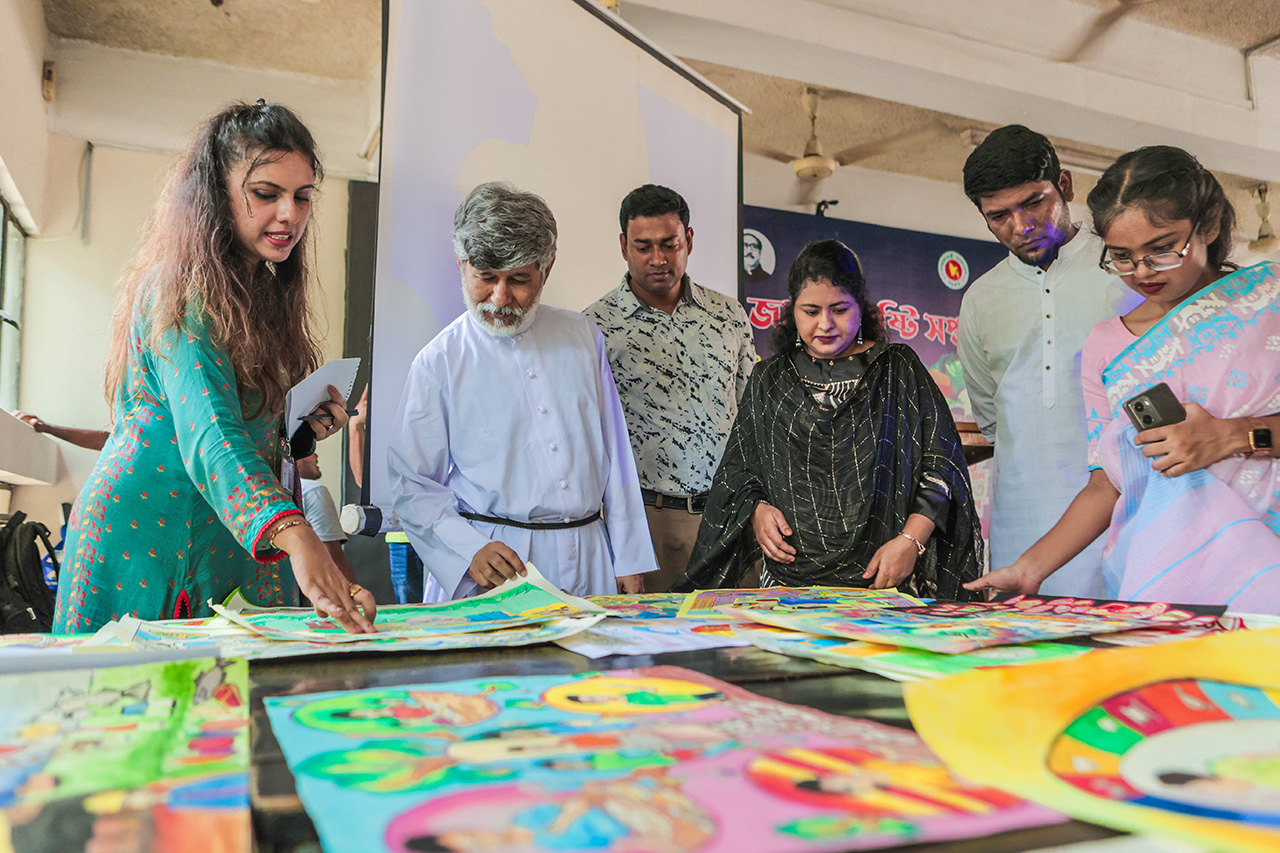
A boot camp was organised on the occasion of National Nutrition Week today on Sunday (13 June) at St. Joseph Higher Secondary School in the capital. The Institute of Public Health Nutrition (IPHN), BRAC, and Bangladesh Institute for ICT in Development (BIID) jointly organised the event.
More than a hundred students of this school participated in the boot camp. They took part in drawing and quiz competitions and speaking events on selected topics. Navid Iqbal from Class IX, Wasif Mursalin and Hassan Monem Reza, both from Class VII, won the first, second, and third prizes, respectively, at the drawing competition. Rafid-un-Nabi, Mahib al Mamun and Hamim Rahman stood respectively first, second, and third at the quiz competition.
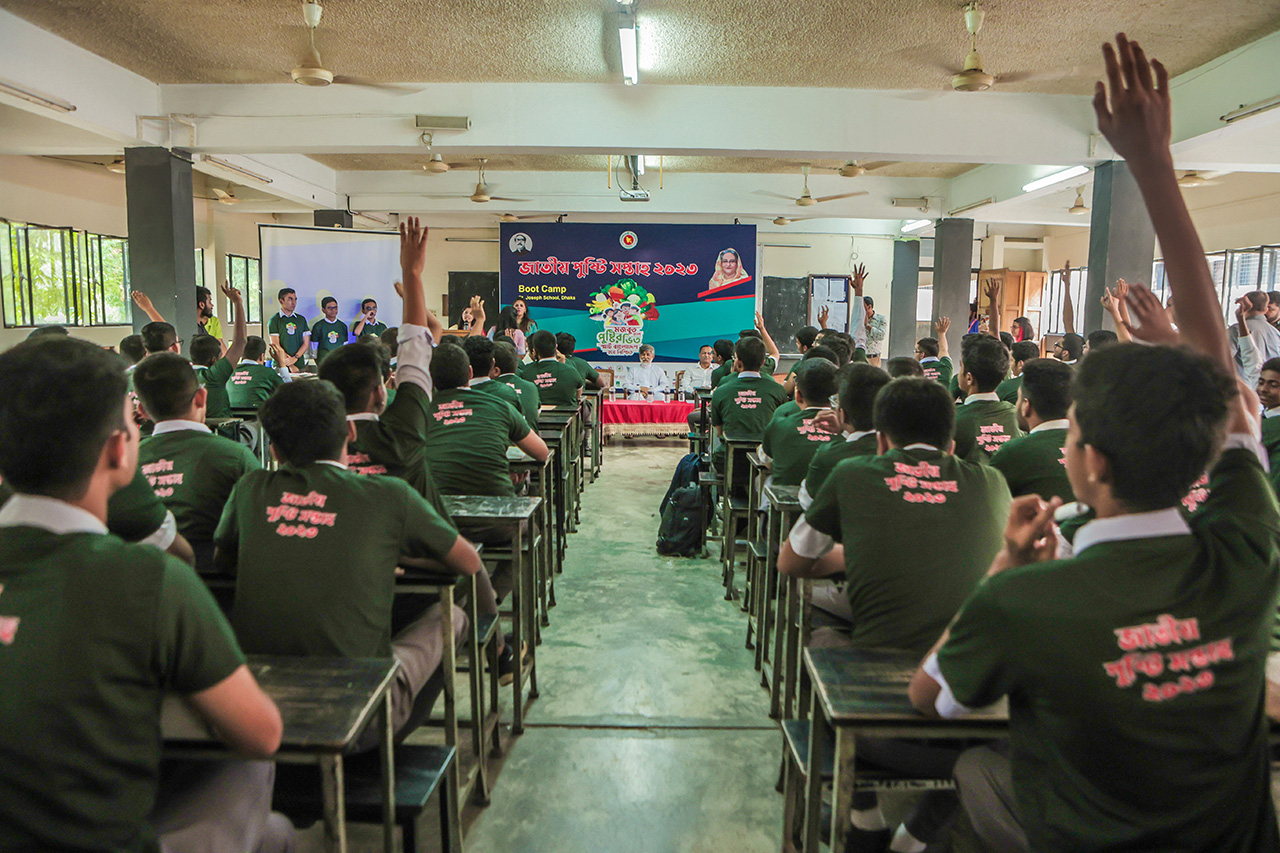 Brother Leo James Pereira, principal, St. Joseph Higher Secondary School; Professor Dr Md Nasir Uddin, director, IPH; Md Shahid Uddin Akbar, chief executive director, BIID; Dr Murad Md Shamsher Tabris Khan, junior clinician, IPHN, and officials from IPHN and BRAC were present at the boot camp, among others.
Brother Leo James Pereira, principal, St. Joseph Higher Secondary School; Professor Dr Md Nasir Uddin, director, IPH; Md Shahid Uddin Akbar, chief executive director, BIID; Dr Murad Md Shamsher Tabris Khan, junior clinician, IPHN, and officials from IPHN and BRAC were present at the boot camp, among others.
IPHN director Professor Dr Md Nasir Uddin addressed the students, saying, “Only a healthy generation can build a good future. It’s therefore important for all of us to be adequately aware of which food we should take and which we shouldn’t.”
BIID chief executive director Md Shahid Uddin Akbar said, “Building Smart Bangladesh needs people with talent. Ensuring nutritious food for the growing generation is a prerequisite to ensuring talented people. This kind of initiative will help fill up the gaps in the knowledge about nutritious food among the school students across the country.”
The event concluded with the guests awarding prizes to the winners.
Earlier, on Wednesday (7 June) National Nutrition Week was launched at a programme at the Osmani Memorial Auditorium in the capital. With this year’s theme ‘Build a strong nutrition base to build Smart Bangladesh’. National Nutrition Week will continue to be observed through different programmes around the country till 13 June.
National Nutrition Week kicks off with aim to build Smart Bangladesh
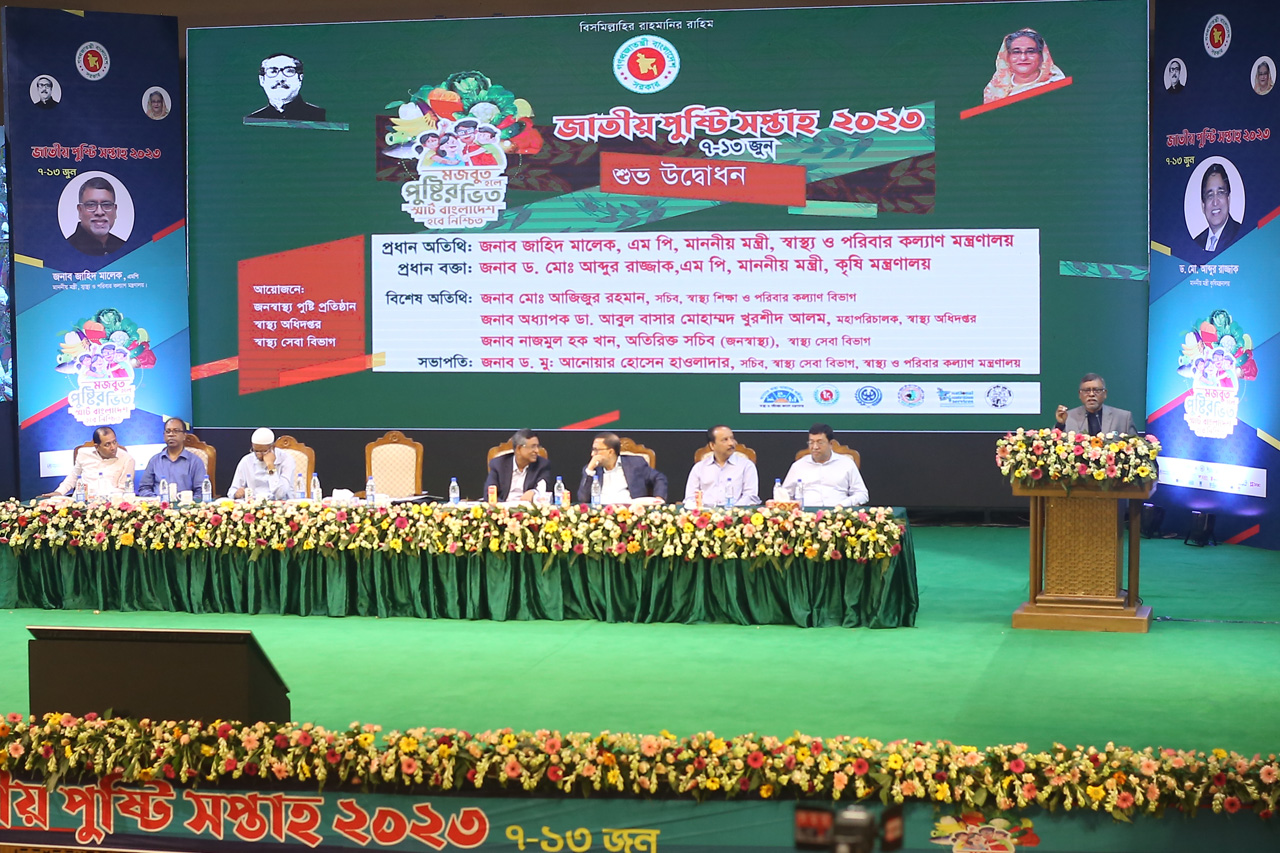
National Nutrition Week 2023 was launched today on Wednesday (7 June) at the Osmani Memorial Auditorium in the capital with this year’s theme ‘Build a strong nutrition base to build Smart Bangladesh’. The week will be observed from 7 June to 13 June.
Dr Muhammad Abdur Razzaque M. P., minister for agriculture was present as the keynote speaker at the programme, with Zahid Maleque M. P., minister for health and family welfare, attending as the chief guest. Dr Md Anwar Hossain Howlader, secretary, Health Services Division, presided over the event. Professor Dr Abul Bashar Mohammed Khurshid Alam, director general of Health Services, gave the welcome speech.
A number of national and international organisations, including BRAC, presented summary of their activities at the launching programme.
Agriculture minister Dr Muhammad Abdur Razzaque M. P. said, “We have taken both the issues of safe food and nutrition-rich food as a challenge. We must ensure nutrition-rich food for the children of Bangladesh to ensure the proper development of their brains. We are working to fulfil this aim.”
Minister for health and family welfare Zahid Maleque M. P. said, “Malnutrition affects our health and education as well. Children with malnourished brain lose capacity to learn. It will ultimately affect both agriculturial and industrial production. People will suffer from diseases more often, which will minimise their ability for hard work.”
Director general of Health Services Professor Dr Abul Bashar Mohammed Khurshid Alam said in his welcome note, “The honourable prime minister made a 12-point pledge to improve the nutritional status of Bangladesh at the ‘Nutrition for the growth’ summit held in Japan in December 2021. Six of those were directly related to health. Our organisation is working to implement those pledges.”
BRAC showcased its activities in the health and nutrition sector at the event. Visitors were informed of many kinds of nutrition-related messages at its stall. BRAC also organised a game titled ‘pushti-ludo’, a tool for learning about nutrition through fun.
Morseda Chowdhury, director, Health Nutrition and Population Programme (HNPP), BRAC said, “What we eat is what we are. Our health reflects what we eat. Our plates must have enough nutritious food to enable us to lead a healthy life. We have to ensure that we are eating nutritious food to prevent diseases.”
Other officials from the ministry of health and family welfare, directorate general of health, Institute of Public Health Nutrition, National Nutrition Services, Bangladesh National Nutrition Council, and representatives from the World Health Organisation (WHO), Food and Agriculture Organisation (FAO), UNICEF, Save the Children, UKAID were also present at the programme.
BRAC opens artificial limb and brace-related service centre at BIRDEM for diabetic patients

BRAC launched its new artificial limb and brace-related service centre on the premises of the BIRDEM General Hospital at Shahbagh in the capital for patients visiting the hospital with the need for brace and limb-related services.
The launch of the centre took place this morning (Saturday, 3 June) at the BIRDEM General Hospital in the presence of Professor M K I Quayyum Choudhury, director general, Bangladesh Institute of Research and Rehabilitation in Diabetes Endocrine and Metabolic Disorders (BIRDEM) as the chief guest. Dr Jonaed Hakim, head, the Department of Orthopedics, BIRDEM General Hospital & Ibrahim Medical College, was also present.
Dr Morseda Chowdhury, director, Health Nutrition and Population Programme (HNPP), BRAC; and Dr Shahinul Hoque Ripon, programme head, HNPP, and head of BRAC Limb and Brace Centre (BLBC), attended the event on behalf of BRAC.
Over 200 participants including heads of other departments, senior physicians and specialists were present at the launching programme.
BIRDEM director general Professor M K I Quayyum Choudhury expressed delight at the opening of the artificial limb and brace centre, saying from now on availing of artificial limb and brace-related quality services will be easier for patients who visit this hospital. “Now we are accommodating an outlet but we have a plan to establish a full-fledged artificial limb and brace centre and workshop on BIRDEM premises. Our partnership will be stronger in future,” said the DG.
BRAC director Dr Morseda Chowdhury gave an overview of BRAC’s health programme, while outlining the gradual expansion of its partnerships with the government health services. “Up till December 2021, BRAC had been providing artificial limb and brace-related services from its own centre. We had entered into a partnership with the government to establish a limb and brace centre and workshop in the compound of Sheikh Hasina National Institute of Burn and Plastic Surgery (SHNIBPS). That centre has already proved its capacity to provide quality services to the patients. In future we hope to further extend our partnerships with other public hospitals,” said Dr Morseda Chowdhury.
In December 2021, BRAC, in collaboration with SHNIBPS established an artificial limb and brace centre in its premises that has been providing quality prosthetics-related services to severely injured fire survivors. BLBC operating since 2000, provides user-friendly quality prosthetics, orthotics and physiotherapy services to amputees and people with disabilities. To date, over 43,000 patients, among them the survivors of Savar factory collapse in 2013 and the Sitakunda container depot fire in 2022, have received these services from BLBC.
BLBC in BIRDEM compound will be open for patients six days a week from 8.00 am to 5.00 pm. The centre will be closed on Fridays.
Established in July 2000, BLBC aimed to increase the independence of physically disabled persons by providing affordable, user-friendly, high-quality artificial limbs, braces and pressure garments.
“Smart Education Festival” held to create a smart educational framework
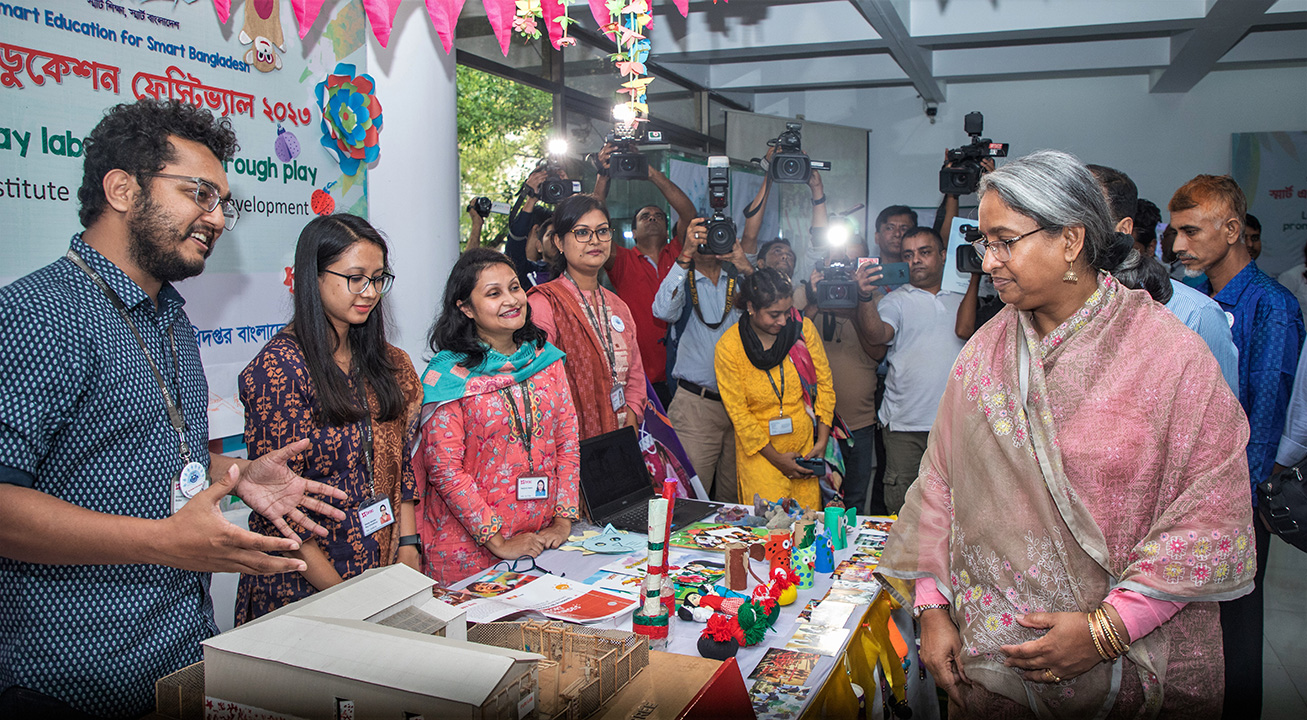
Smart Education Festival was held with the goal of creating a smart education framework. The festival was organised by the Directorate of Secondary and Higher Education (DSHE) at the International Mother Language Institute, Segunbagicha, Dhaka from 29 to 31 May.
The festival marked the commencement of the smart education strategy aimed at implementing the new curriculum, with the ultimate goal of building a smart Bangladesh. The event featured twenty smart education activities, and people from all walks of life participated in ten seminars held during the festival.
During the inaugural ceremony of the Smart Education Festival, the Minister for Education, Dr. Dipu Moni, M. P., was present as the chief guest. In her address, Dr. Dipu Moni explained the plans and objectives of the festival, highlighting the importance of smart education in the development of Bangladesh's educational system.
Deputy Minister for Education, Mohibul Hassan Chowdhoury, M. P.; Md. Kamal Hossain, Senior Secretary, Technical and Madrasah Education Division; Suleman Khan, Secretary, Secondary and Higher Education Division were present as special guests. Professor Md. Shahedul Khabir Chowdhury, Director (College and Administration), DSHE made the opeing remarks at the inaugural ceremony. The programme was chaired by Professor Nehal Ahmed, Director General, DSHE.
During the opening ceremony, Dr. Dipu Moni emphasised the significance of smart citizens in building a smart Bangladesh. She highlighted that smart citizens can be developed through smart education, with a crucial element being the new curriculum. Dr. Dipu Moni expressed gratitude for the collective effort of partners and stakeholders invested in developing a robust curriculum.
During his speech as the special guest, Deputy Minister for Education, Mohibul Hassan Chowdhoury, M. P., stated that the progression from Digital Bangladesh to Smart Bangladesh is the next logical step. Smart education was highlighted as a crucial tool in realising this vision. The main goal set forth was to break away from conventional practices and norms.
BRAC Institute of Educational Development (BRAC IED) actively participated in the event, showcasing a diverse range of materials focused on Early Childhood Development (ECD), mental health, and learning through play at their stall. In BRAC’s play-based Play Labs, children can engage in play-based learning and activities that foster holistic childhood development. Like the BRAC Play Lab, the play materials are made using local materials collected at low or no cost. The Play Labs are designed to be child-friendly and fun-filled and spread out over children's imaginary worlds.
Several educational institutions exhibited different themes with stalls in this three-day festival.
A number of seminars and discussions took place in the festival. On the second day of the festival, Directorate of Secondary and Higher Education organised a seminar on “Smart Education for Smart Bangladesh”; Bangladesh Accreditation Council organised “Quality Assurance in Higher Education for Smart Bangladesh”; “Role of Madrasah Education in Building Smart Bangladesh” was organised by Directorate of Madrasah Education and “Smart TVET for Smart Bangladesh” conducted by Bangladesh Technical Education Board. A seminar on “Role of New Curriculum in Education in Building Smart Bangladesh” was also organised by National Curriculum and Textbook Board.
On the final day of the festival, Board of Secondary and Higher Education organised a seminar on “Smart Examination System for Implementation of Smart Education”; “Smart Teacher Training for Smart Education” was organised by National Academy of Education Management (NAEM); and seminar on “Non-Formal Early Childhood Development” was conducted by BRAC.
World Bank and BRAC advocacy event stress the use of standard motorcycle helmets

A discussion event focusing on the importance of the use of national safety standard helmets for motorcycle riders took place today on Sunday (21 May) at the Pan Pacific Sonargaon Hotel. Key personnel of government, World Bank, civil society, private sector, and non-governmental organisations involved in this issue participated in the discussion.
BRAC and the World Bank jointly organised the advocacy event.
Chief guest at the event was ABM Amin Ullah Nuri, Secretary, Road Transport and Highways Division. Nur Mohammad Mazumder, chairman, Bangladesh Road Transport Authority (BRTA); Md Abdus Sattar, director general, Bangladesh Standard and Testing Institution (BSTI); Md Atiqul Islam, additional inspector general of Police (crime and operations); and Abdoulaye Seck, country director for Bangladesh and Bhutan, World Bank, were special guests of the programme.
The welcome speech by Dipan Bose, senior transport specialist, World Bank, and team leader, World Bank-financed Bangladesh Road Safety Project, highlighted that “The World Bank recognises the importance of road safety as a critical development priority. We are committed to working together with the Government of Bangladesh and all relevant stakeholders in this endeavour”.
Chief Guest of the event Road Transport and Highways Division secretary ABM Amin Ullah Nuri in his speech said, "I am not for restricting motorcycles as a mode of transport. What we need to do is ensure safety. We have to remove substandard helmets. I request all from the NGOs to other stakeholders to move forward to create awareness. The government cannot alone implement the standard helmet law. We have to create a social movement."
BRTA chairman Nur Mohammad Mazumder said, "The use of motorcycles is increasing with the growth of our economy. An increasing number of motorised vehicles and roads as well give way to a rise in road crashes. Often reckless driving lies behind road crashes, while wearing no helmets at all or substandard helmets contributes to the severity of casualties. Now that BSTI has fixed the helmet standard for Bangladesh, we have to make sure that no one is allowed to ride motorcycles without wearing the standard safety helmets."
BSTI director general Md Abdus Sattar recommended safe driving education for vehicle riders in all training programmes, arranging a series of awareness programmes with relevant stakeholders, enforcing the law on the motorcycle riders, making licence issuing process for riders more rigorous, not selling fuel without the rider wearing BDS 1136 certified helmet.
Additional inspector general of Police Md Atiqul Islam said, “While we have been successful in creating a steady downward trend for homicides in recent years, road accidents and resulting deaths could not be checked so steadily. In the first three months of this year out of 915 total vehicles involved in different accidents, motorcycles were 147. The actual number of motorcycle accidents may be even higher. It’s a matter of grave concern that many lives are lost each year worldwide due to the neglect of simple safety measures, such as wearing proper helmets”.
Abdoulaye Seck, country director for Bangladesh and Bhutan, World Bank, said, "I want to congratulate the Government of Bangladesh for its adoption of the national safety standard for helmets in October 2022. Unfortunately, most helmets available in Bangladesh do not meet international standards when it comes to quality and protection. World Bank is honoured to partner with Federation Internationale de l'Automobile, BRAC and the Government of Bangladesh to launch and advocate for standard helmets”.
Pierre CASTAING, international consultant for World Bank for its road safety initiatives, said, "Now that the government of Bangladesh has enacted its law making it compulsory to wear a standard helmet, facilitation measures should be undertaken to execute the law. This can be done by banning the use of non-standard or modified helmets and enforcing the law at three levels i.e. importers and producers, dealers and users".
Ahmed Najmul Hussain, director, Road Safety Programme, BRAC, said, “Enforcing laws for standard helmets will need both training of traffic police as well as setting up of traffic cameras, especially on city roads and highways to watch on the helmets used by the riders. Public awareness of the law is crucial to its compliance and law enforcement. People are more willing to abide by laws when they learn its benefits”.
Dilshad Dossani, programme coordinator, World Bank, presented a summary of recommendations on the basis of discussion at the advocacy event in her concluding remarks. The recommendations included formation of a committee comprising government and non-government organisations concerned to prepare a roadmap, strategies and activities plan focusing on how the national safety standard helmets would be implemented, where and how many testing institutes will be required to be set up, how the police will be oriented and trained for enforcement, when will standard helmets be available in the market at an affordable price, how the awareness programs will continuously be planned for the general public and how the roadmap for updating national legal framework regarding certification and use of motorcycle helmets will be adopted and implemented.”
After the discussion was concluded, UN standard helmets were distributed among selected individuals.
The UN Global Road Safety Week is being observed for the 7th time and this year the stretch of 15 - 21 May has been selected for its observance. Hashtags #RethinkMobility #StreetsforLife #RoadSafety is being used this year to promote the campaign on social media platforms to create mass awareness.
Road crashes are one of the major reasons in the world for untimely deaths and physical disability. According to the World Health Organisation, nearly 1.3 million people die and 20-50 million people receive injuries in road crashes every year. Many of the injured become permanently disabled. Around 60% of the world’s vehicles are in low- and middle-income countries, while these countries share an overwhelming 93% of the total road crashes. One in every four people who die in road crashes is a pedestrian or cycle rider.
BRAC, Dutch-Bangla Bank launch partnership for financial inclusion
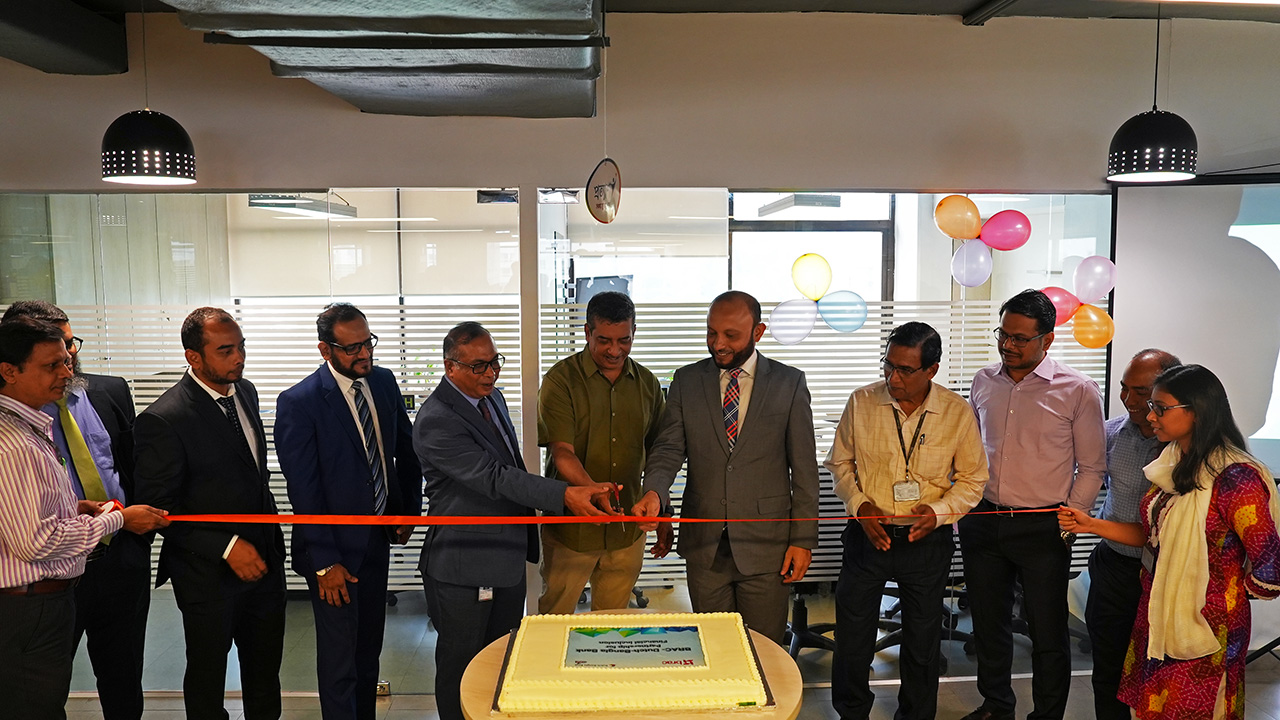
BRAC and Dutch-Bangla Bank have started a partnership for financial inclusion. Arinjoy Dhar, senior director, Microfinance, BRAC, and Abedur Rahman Sikder, deputy managing director, Dutch-Bangla Bank Ltd, launched the initiative at a ceremony on Wednesday (3 May 2023) at the BRAC Centre.
At the launching event the speakers focused on the importance of digital technology to enhance financial services for clients. Under this partnership, client interaction points (CIP) of BRAC Microfinance will provide financial services mainly for the workers of readymade garments industry through digital transactions.
The partnership was inaugurated at 11am by cutting ribbon and cake. Earlier on 15 January this year, the two organisations signed a deed of agreement for the partnership. Speakers also noted that the initiative will be marked as a milestone for digital cash transactions.
BRAC Microfinance senior director Arinjoy Dhar said, “BRAC is working for the marginalised communities. Besides this digital service, we are also interested to explore other avenues for joint initiatives with Dutch-Bangla Bank.”
Dutch-Bangla Bank deputy managing director Abedur Rahman Sikder said, “We are delighted to start this partnership with BRAC. We’ll be really glad to create opportunities for our clients through our digital services.”
Later on at the event, the representatives of the digital transformation unit of BRAC Microfinance called on all concerned to work together to take this partnership forward.
BRAC celebrates its 50th anniversary at Houses of Parliament in London
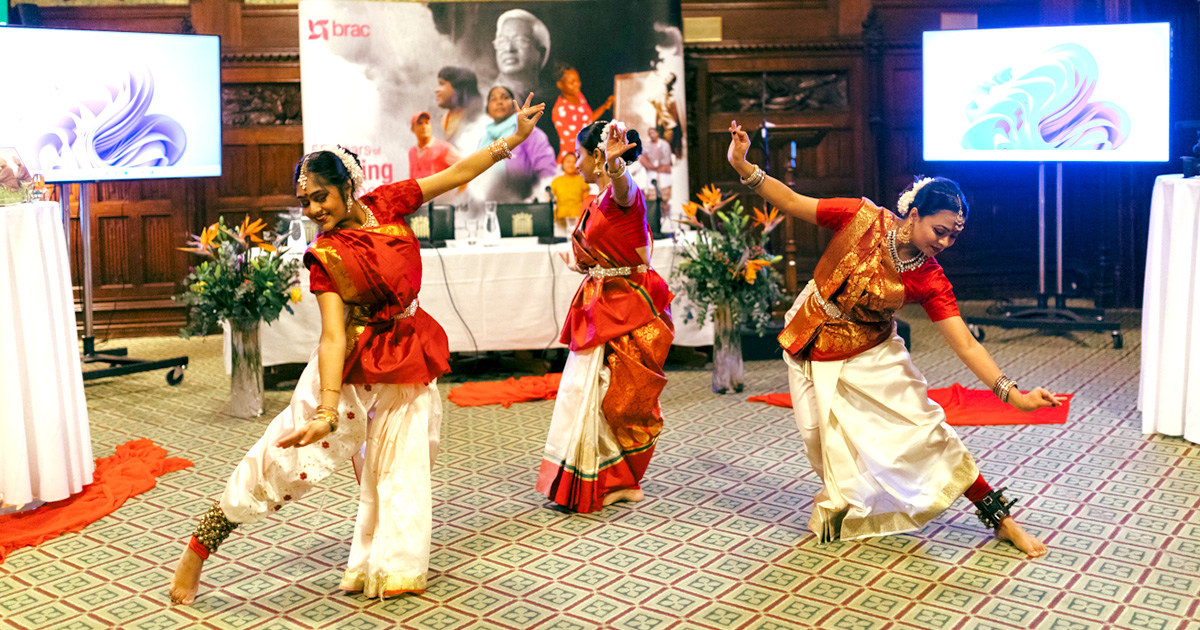
Earlier this month we celebrated our 50th anniversary at the Houses of Parliament in London, where we were joined by over 150 partners and friends of BRAC.
We were fortunate to have speeches and participation from:
- Chris Law MP, who was also our gracious host for the evening.
- Lewis Temple, Chief Executive of BRAC’s London Office
- Her Excellency Saida Muna Tasneem, Bangladesh’s High Commissioner to the UK, Ireland and Liberia (Watch speech)
- Asif Saleh, Executive Director of BRAC, and Shameran Abed, Executive Director of BRAC International and Baroness Minouche Shafik, President and Vice Chancellor of the London School of Economics and Political Science, as moderator. (Watch panel discussion)
- Scott MacMillan, the author of Hope Over Fate: the wonderful newly published biography of our late founder Sir Fazle Hasan Abed.
- A troupe of dancers from Akademi who performed traditional Bengali dances. Their upcoming show Pravass will take place in May and share stories of the climate-driven migration of people from the Sundarbans mangrove forest in India and Bangladesh.
- A special video address from Andrew Mitchell, the Minister for Development and Africa at the United Kingdom’s Foreign, Commonwealth & Development Office (FCDO).
Now that the 50th Anniversary year has officially come to a close, we look forward to a bright future and 50 more transformative and impactful years for the BRAC family.
You can view our video summary of the event to get a feel for the celebrations.
More...
Join the world’s biggest family

